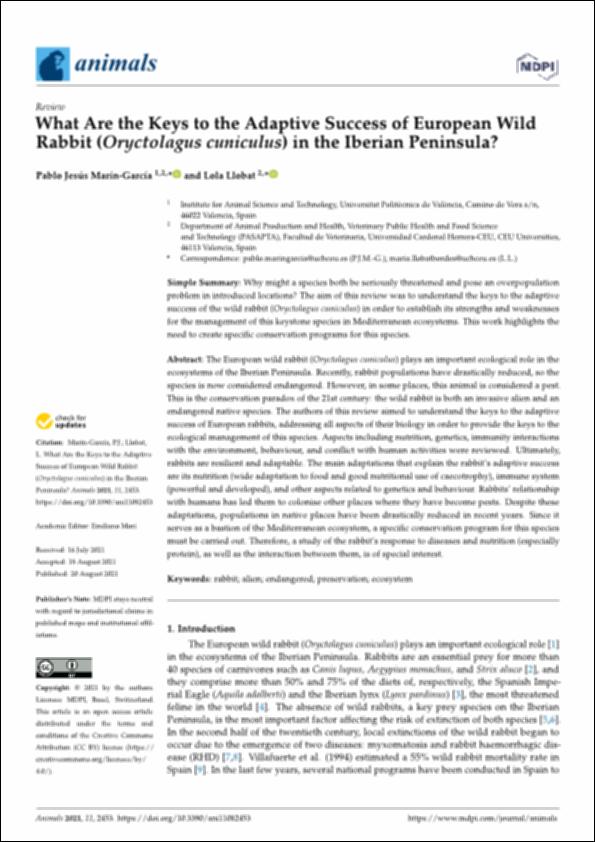Por favor, use este identificador para citar o enlazar este ítem:
http://hdl.handle.net/10637/13438What are the keys to the adaptive success of European wild rabbit (Oryctolagus cuniculus) in the Iberian Peninsula?
| Título : | What are the keys to the adaptive success of European wild rabbit (Oryctolagus cuniculus) in the Iberian Peninsula? |
| Autor : | Marín García, Pablo Jesús Llobat Bordes, Lola |
| Materias: | Rabbits - Preservation.; Conejos - Preservación.; Biotic communities.; Ecosistemas. |
| Editorial : | MDPI |
| Citación : | Marin Garcia, PJ. & Llobat, L. (2021). What are the keys to the adaptive success of European wild rabbit (Oryctolagus cuniculus) in the Iberian Peninsula?. Animals, vol. 11, n. 8 (20 aug.), art. 2453. DOI: https://doi.org/10.3390/ani11082453 |
| Resumen : | The European wild rabbit (Oryctolagus cuniculus) plays an important ecological role in the ecosystems of the Iberian Peninsula. Recently, rabbit populations have drastically reduced, so the species is now considered endangered. However, in some places, this animal is considered a pest. This is the conservation paradox of the 21st century: the wild rabbit is both an invasive alien and an endangered native species. The authors of this review aimed to understand the keys to the adaptive success of European rabbits, addressing all aspects of their biology in order to provide the keys to the ecological management of this species. Aspects including nutrition, genetics, immunity interactions with the environment, behaviour, and conflict with human activities were reviewed. Ultimately, rabbits are resilient and adaptable. The main adaptations that explain the rabbit’s adaptive success are its nutrition (wide adaptation to food and good nutritional use of caecotrophy), immune system (powerful and developed), and other aspects related to genetics and behaviour. Rabbits’ relationship with humans has led them to colonise other places where they have become pests. Despite these adaptations, populations in native places have been drastically reduced in recent years. Since it serves as a bastion of the Mediterranean ecosystem, a specific conservation program for this species must be carried out. Therefore, a study of the rabbit’s response to diseases and nutrition (especially protein), as well as the interaction between them, is of special interest. |
| Descripción : | Este artículo se encuentra disponible en la siguiente URL: https://www.mdpi.com/2076-2615/11/8/2453 Este artículo pertenece a la colección "Advances in Canine Leishmaniosis". |
| URI : | http://hdl.handle.net/10637/13438 |
| Derechos: | http://creativecommons.org/licenses/by/4.0/deed.es |
| Fecha de publicación : | 20-ago-2021 |
| Centro : | Universidad Cardenal Herrera-CEU |
| Aparece en las colecciones: | Dpto. Producción y Sanidad Animal, Salud Pública Veterinaria y Ciencia y Tecnología de los Alimentos |
Los ítems de DSpace están protegidos por copyright, con todos los derechos reservados, a menos que se indique lo contrario.


